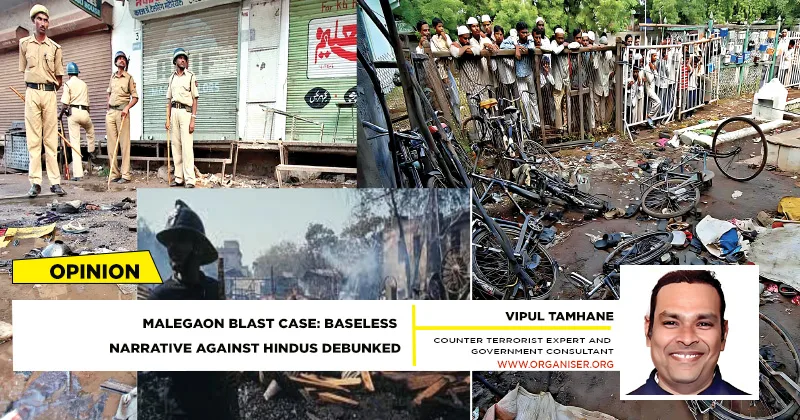Politics
Seven Acquitted in Malegaon Blast Case After 17-Year Trial

The acquittal of all seven accused in the 2008 Malegaon bomb blast case has concluded a lengthy 17-year legal battle. The ruling, delivered by Special Judge AK Lahoti on July 31, 2025, found that the prosecution failed to establish the allegations against the accused beyond reasonable doubt. This verdict has reignited discussions around the narrative of “Hindu terror” that emerged during the investigation.
On September 29, 2008, a low-intensity bomb exploded at Bhikku Chowk in Malegaon, Maharashtra, killing six people and injuring 95 others. Following the attack, the Maharashtra Anti-Terrorism Squad (ATS) took over the investigation, leading to the arrest of several individuals, including former BJP MP Pragya Singh Thakur and Lt Col Prasad Purohit. The arrests sparked a heated debate about the so-called “Hindu terror” narrative, which critics argue was politically motivated.
The court’s ruling emphasized that mere suspicion cannot advance a criminal case, a principle that underpins criminal jurisprudence. Judge Lahoti noted that while a blast occurred, the prosecution did not successfully connect the accused to the conspiracy or the act itself. Key evidence, such as the motorcycle allegedly used in the blast, was not conclusively linked to Thakur, who had renounced material possessions two years before the incident.
Timeline of Events
The timeline of the Malegaon case reveals a complex legal journey. After the initial explosion, the ATS arrested Thakur and others, claiming their involvement in a broader conspiracy. Following these arrests, the case underwent numerous legal shifts, including transfers to the National Investigation Agency (NIA) and changes in charge applicability under various laws.
Significant events included:
– **2008**: The explosion occurs, leading to immediate investigations.
– **2009**: The ATS files its first charge sheet against 11 accused.
– **2011-2012**: The case is transferred to the NIA, which begins an independent investigation.
– **2016**: The NIA files a supplementary charge sheet, dropping MCOCA charges and alleging coercion in confessions.
– **2025**: After years of trial, the court delivers its final verdict, acquitting all accused.
Judge Lahoti’s findings were particularly scathing toward the prosecution, which was unable to prove crucial details. For instance, the claim that Lt Col Purohit procured the RDX or assembled the bomb was not substantiated. Additionally, the court highlighted irregularities, including evidence that may have been planted by ATS officials.
Concerns Over Evidence and Conduct
One of the most alarming revelations in this case was the allegation of evidence fabrication. An Army inquiry indicated that explosives were allegedly planted at the residence of one accused, raising significant questions about the integrity of the investigation. The court found that ATS officials had coerced confessions from suspects, undermining the credibility of the entire case.
These developments have led to broader discussions about the implications of the verdict. The narrative of “saffron terror,” coined by political figures in the past, has been scrutinized as a potential tool for political advantage, particularly in the context of Hindu-Muslim relations in India.
In a statement following the verdict, Thakur remarked, “Saffron has won, Hindutva has won, the allegation of saffron terrorism has been proved false.” Her comments reflect a sense of vindication after years of what she described as persecution.
The acquittal serves not just as a legal conclusion but as a reminder of the potential for the criminal justice system to be politicized. It underscores the necessity for rigorous standards in criminal investigations to uphold justice and prevent misuse of power.
The case remains a pivotal moment in India’s ongoing discourse surrounding terrorism, communal identity, and the interplay of politics and law. The ruling raises questions about accountability and highlights the need for transparency in investigations, particularly those involving sensitive communal issues.
-

 World5 months ago
World5 months agoSBI Announces QIP Floor Price at ₹811.05 Per Share
-

 Lifestyle5 months ago
Lifestyle5 months agoCept Unveils ₹3.1 Crore Urban Mobility Plan for Sustainable Growth
-

 Science4 months ago
Science4 months agoNew Blood Group Discovered in South Indian Woman at Rotary Centre
-

 World5 months ago
World5 months agoTorrential Rains Cause Flash Flooding in New York and New Jersey
-

 Top Stories5 months ago
Top Stories5 months agoKonkani Cultural Organisation to Host Pearl Jubilee in Abu Dhabi
-

 Sports4 months ago
Sports4 months agoBroad Advocates for Bowling Change Ahead of Final Test Against India
-

 Science5 months ago
Science5 months agoNothing Headphone 1 Review: A Bold Contender in Audio Design
-

 Top Stories5 months ago
Top Stories5 months agoAir India Crash Investigation Highlights Boeing Fuel Switch Concerns
-

 Business5 months ago
Business5 months agoIndian Stock Market Rebounds: Sensex and Nifty Rise After Four-Day Decline
-

 Sports4 months ago
Sports4 months agoCristian Totti Retires at 19: Pressure of Fame Takes Toll
-

 Politics5 months ago
Politics5 months agoAbandoned Doberman Finds New Home After Journey to Prague
-

 Top Stories5 months ago
Top Stories5 months agoPatna Bank Manager Abhishek Varun Found Dead in Well









